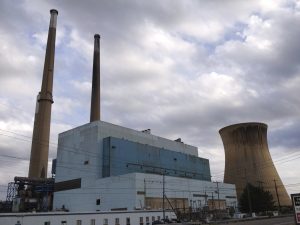
Mention Pleasants Power Station to a long-time West Virginian and they’ll no doubt tell you about one of the greatest construction accidents in the history of the U.S. At this power station, located in western Pleasants County, West Virginia, 51 construction workers died when a cooling tower that was under construction collapsed on site in 1978. It was a dark time for the people of Pleasants County, many of them personally touched in some way or another by the tragedy.
Later, OSHA determined that a number of safety lapses at the site caused the tower and the attached scaffolding to collapse, including uncured concrete, missing bolts, an improper concrete hoisting system, and the fact that the job was being rushed. In all, these lapses spelled disaster for those who were working at the site.
This tragedy wasn’t the only Pleasants Power Station -related issue that has affected the residents of Pleasants County, West Virginia. Many have been sickened by the particulates released from this and other similar coal-fired power plants. In that fine particle pollution, you’ll find heavy metals, soot, sulfux dioxide, and a host of other toxins that can cause severe cases of respiratory and heart diseases.
Other Pleasants Power Station Diseases
Other respiratory diseases have resulted from workers’ exposure to asbestos while on the job. Working at a power plant of any kind comes with risks. Most employees – past and present – understand that. Many things can go wrong in an instant, with injury or even death as a result.
But Pleasants Power Station employees who worked there at a time when asbestos use was rampant had little or no idea that breathing in asbestos dust was eventually going to make them sick.
Asbestos enjoyed many uses at power plants throughout the U.S. until just before the 1980s, when government rules recommended the cessation of asbestos use. Employees may have found asbestos material wrapped around pipes or boilers. It may have been used in lagging, ropes, and a variety of textiles.
Workers may have even worn protective clothing that contained asbestos, designed as such to help workers avoid burns. Who would have known that this clothing, meant to keep workers safe, was making them sick?
Well, chances are that the powers-that-be at Willow Island and other West Virginia power companies may have very well known that asbestos was unsafe. However, because asbestos materials were often cheap and abundantly available, they were a favorite with plant owners. In short, more regard was given to the “bottom line” than to the safety of those who worked on site.
As a result, power plant workers from Pleasants Power Station and other area plants have died of mesothelioma or are currently suffering from the disease.
This exposure shouldn’t have happened but victims of the disease don’t need to deal with this situation on their own. Help is available in the form of legal options that may including filing a lawsuit against those who are responsible for the exposure. A consultation with a West Virginia mesothelioma lawyer can help you determine how to properly proceed and may spell some relief for victims of mesothelioma and their families.
